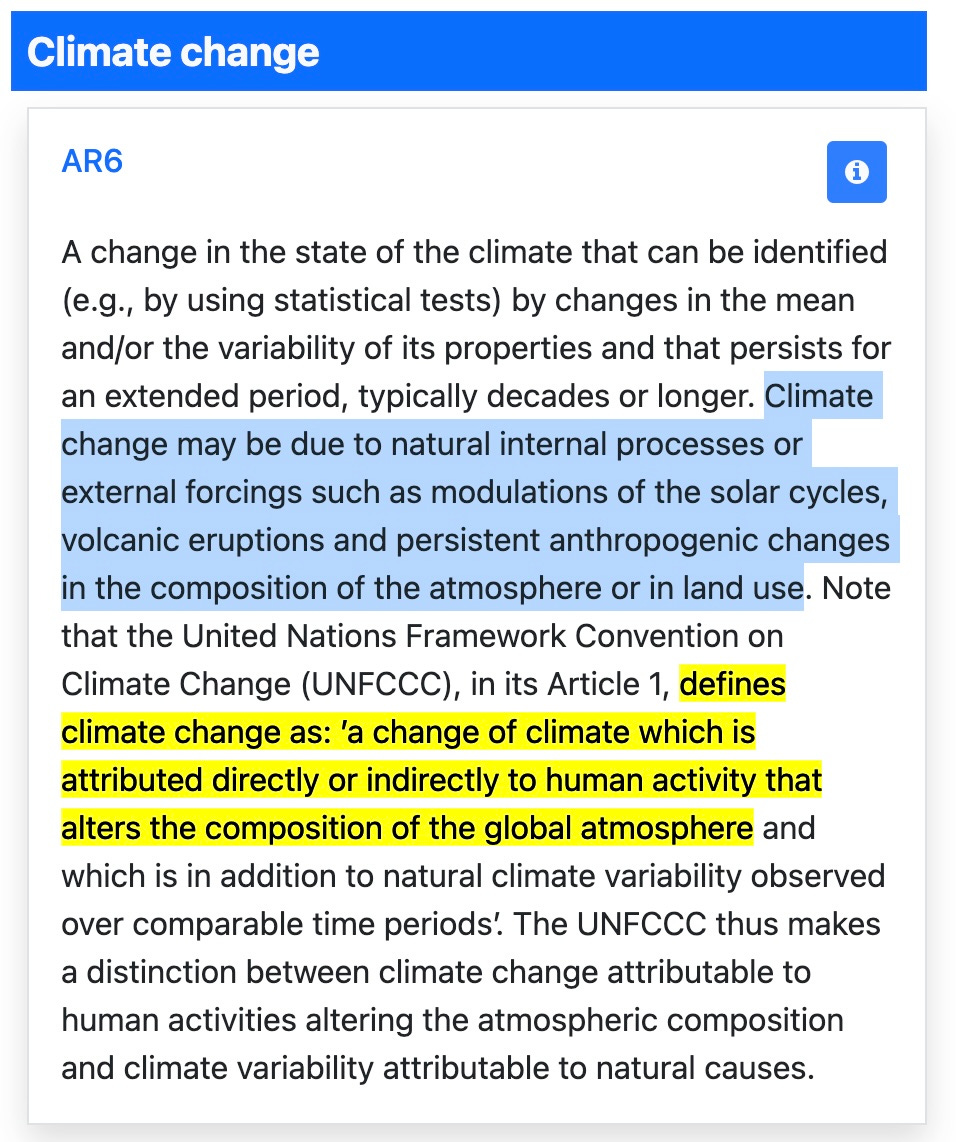Define Before Using: "Climate Change"
An entry in the Sustain What #Watchwords series
As “climate change” debates, assertions and demands flow in this stormy, overheating year - measured both in climatic and political terms - it’s worth posting a quick reminder as part of my #Watchwords series: If you’re going to argue, write or post about climate change, make sure to specify what you mean when you use that term.
Watchwords are terms that can accidentally, or intentionally, confuse more than clarify. Here’s the series link.
As Roger Pielke Jr. wrote almost 20 years ago in a peer-reviewed analysis and revisited in 2022, the two main organizations on the planet dealing with climate change - the IPCC (the U.N. Intergovernmental Panel on Climate Change) and the UNFCCC (the U.N. Framework Convention on Climate Change, a k a the climate treaty that includes the Pars Agreement etc.) - define the term profoundly differently, and the difference can amplify confusion and distort findings and policies.
Here are the two definitions (blue is IPCC, yellow UNFCCC), from the IPCC glossary:
This issue might seem kind of technical but it is demonstrably a problem, as Pielke explained in the post linked above:
“One result of this confusion is an implicit bias against adaptation policies in the IPCC reports, and by extension, in policy discussions. For instance, the discussion of ‘Loss and Damage’ under the FCCC has often been hamstrung by this issue, as questions such as the following are often raised in debates.
What damages related to climate can be attributed to greenhouse gases?
What about the societal conditions that create exposures and vulnerabilities regardless the precise causality behind weather events?
Who is responsible for overall damage in the context of complex causality?
Is attribution to greenhouse gases necessary to free up and justify international funding? And on and on it goes.”
Post this graphic on social media when you see the climate change muddle playing out:
But defining terms is important beyond the arena of geopolitics. Any discussion only works if discussants know what they’re all talking about. You don’t have to agree on your definitions, but you have to understand the ones in each others’ heads!
Help me build a full Watchwords lexicon by joining those contributing financially through their Sustain What subscriptions.
Watchwords in the news
Sadly the news media don’t do enough of this. Words are tossed around with clicks seemingly the goal more than meaning. Remember my webcast and post on the scientific and popular meanings of “collapse”?
A great counterexample is Global Press. Visit my conversation and webcast with the leaders of this network of female journalists in some of the toughest trouble spots on Earth to learn about their living style guide avoiding using words without defining them.
When I was at The New York Times, I pushed for us to maintain what were called “Topics Pages” - pages readers found when they clicked on a highlighted phrase like climate change or the name of a country or the like. They were maintained by reporters, kind of the way Wikipedians maintain Wikipedia entries. I maintained the climate change page. (See my webcast on climate Wikipedians for more.)
As The Times education team noted years ago, “Teachers tell us that Times Topics pages are great places to go to learn about specific topics quickly and easily-and arguably a better starting place for research than the site search engine.”
Here’s the archived home page for Times Topics:
This approach allowed curious readers to click and immediately understand what The Times meant when it used such a phrase. But of course that took work.
Now when you click on climate change link in a Times story it just leads you to more Times storiess on climate change - without letting readers know if the paper is using the IPCC or UNFCCC definition or has its own.
That’s a lost opportunity.
What meaning is in your head when you think of climate change?






